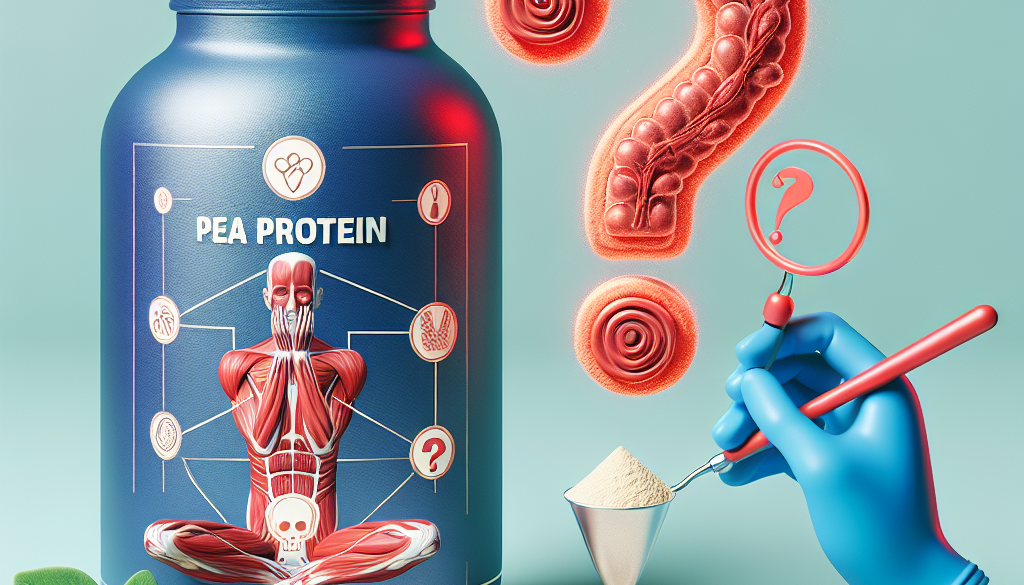Does Pea Protein Increase Inflammation? Discover More
Table of Contents
- Pea Protein and Inflammation: Uncovering the Truth
- Understanding Inflammation
- Pea Protein: An Overview
- Investigating the Link Between Pea Protein and Inflammation
- Nutritional Profile and Anti-Inflammatory Potential
- Research Findings
- Comparing Pea Protein to Other Protein Sources
- Pea Protein in Anti-Inflammatory Diets
- Conclusion: Pea Protein as a Healthy Protein Choice
- Discover ETprotein’s Premium Pea Protein Products
Pea Protein and Inflammation: Uncovering the Truth
As the popularity of plant-based diets continues to rise, so does the demand for alternative protein sources. Pea protein has emerged as a favorite among health enthusiasts and those with dietary restrictions. However, with its rise in popularity, questions regarding its health implications have also surfaced. One such question is whether pea protein can increase inflammation in the body. This article delves into the scientific research surrounding pea protein and its effects on inflammation.
Understanding Inflammation
Inflammation is the body’s natural response to protect itself against harm. There are two types of inflammation: acute and chronic. Acute inflammation is the immediate, short-term response to an injury or infection, while chronic inflammation is a prolonged, often less intense response that can play a role in various diseases, including heart disease, diabetes, and cancer.
Pea Protein: An Overview
Pea protein is derived from yellow split peas and is a high-quality alternative to animal-based proteins. It is rich in essential amino acids and is often praised for its digestibility and hypoallergenic properties. Unlike some plant proteins, pea protein is considered a complete protein, meaning it contains all nine essential amino acids required by the body.
Investigating the Link Between Pea Protein and Inflammation
To understand whether pea protein contributes to inflammation, it is essential to review the scientific literature and examine the nutritional profile of pea protein.
Nutritional Profile and Anti-Inflammatory Potential
Pea protein contains several components that may influence inflammation:
- Amino Acids: Pea protein is rich in branched-chain amino acids (BCAAs), which are known to support muscle recovery and may have anti-inflammatory effects.
- Antioxidants: Peas contain antioxidants like polyphenols, which can combat oxidative stress and may reduce inflammation.
- Arginine: This amino acid, found in pea protein, may support the immune system and has potential anti-inflammatory properties.
Research Findings
Several studies have investigated the effects of pea protein on inflammation with varying results:
- A study published in the Journal of Inflammation found that pea protein hydrolysate could reduce inflammation markers in rats.
- Another study in the British Journal of Nutrition suggested that pea protein did not significantly affect inflammation markers in human subjects compared to whey protein.
- Research in the Journal of Food Science indicated that peptides derived from pea protein might have anti-inflammatory effects.
While these studies provide some insights, more research is needed to fully understand the relationship between pea protein and inflammation in humans.
Comparing Pea Protein to Other Protein Sources
When considering the inflammatory potential of pea protein, it’s helpful to compare it to other protein sources:
- Animal Proteins: Some animal proteins, particularly red and processed meats, have been associated with increased inflammation. Pea protein offers a plant-based alternative that may have a lower inflammatory impact.
- Soy Protein: Like pea protein, soy is a complete plant-based protein. However, soy can be allergenic to some individuals, whereas pea protein is generally considered hypoallergenic.
- Whey Protein: Whey protein is a dairy-derived protein that can be inflammatory for those with lactose intolerance or dairy allergies. Pea protein serves as a lactose-free alternative.
Pea Protein in Anti-Inflammatory Diets
Anti-inflammatory diets often emphasize plant-based foods, including fruits, vegetables, nuts, seeds, and plant proteins. Pea protein aligns with this dietary approach and can be included in meals and snacks to support an anti-inflammatory eating pattern.
Conclusion: Pea Protein as a Healthy Protein Choice
In conclusion, current research does not support the notion that pea protein increases inflammation. In fact, its nutritional profile, rich in amino acids and antioxidants, suggests that it may have anti-inflammatory properties. As with any dietary component, individual responses can vary, and it’s essential to consider personal health conditions and dietary needs.
For those looking to incorporate pea protein into their diet, ETprotein offers a range of high-quality, organic pea protein products that are non-GMO and allergen-free. With a neutral taste and over 98% purity, ETprotein’s pea protein is an excellent choice for anyone seeking to manage inflammation through diet.
Discover ETprotein’s Premium Pea Protein Products
ETprotein is dedicated to providing top-tier plant-based protein options that cater to various dietary requirements and health goals. Their pea protein products are designed to integrate seamlessly into any anti-inflammatory diet, supporting overall health and wellness.
About ETprotein:
ETprotein, a reputable protein and L-(+)-Ergothioneine (EGT) Chinese factory manufacturer and supplier, is renowned for producing, stocking, exporting, and delivering the highest quality organic bulk vegan proteins and L-(+)-Ergothioneine. They include Organic rice protein, clear rice protein, pea protein, clear pea protein, watermelon seed protein, pumpkin seed protein, sunflower seed protein, mung bean protein, peanut protein, and L-(+)-Ergothioneine EGT Pharmaceutical grade, L-(+)-Ergothioneine EGT food grade, L-(+)-Ergothioneine EGT cosmetic grade, L-(+)-Ergothioneine EGT reference grade and L-(+)-Ergothioneine EGT standard. Their offerings, characterized by a neutral taste, non-GMO, allergen-free attributes, with L-(+)-Ergothioneine purity over 98%, 99%, cater to a diverse range of industries. They serve nutraceutical, pharmaceutical, cosmeceutical, veterinary, as well as food and beverage finished product distributors, traders, and manufacturers across Europe, USA, Canada, Australia, Thailand, Japan, Korea, Brazil, and Chile, among others.
ETprotein specialization includes exporting and delivering tailor-made protein powder and finished nutritional supplements. Their extensive product range covers sectors like Food and Beverage, Sports Nutrition, Weight Management, Dietary Supplements, Health and Wellness Products, and Infant Formula, ensuring comprehensive solutions to meet all your protein needs.
As a trusted company by leading global food and beverage brands and Fortune 500 companies, ETprotein reinforces China’s reputation in the global arena. For more information or to sample their products, please contact them and email sales(at)ETprotein.com today.














